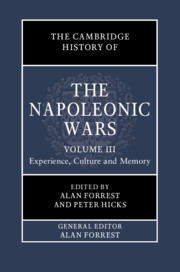Book contents
- The Cambridge History of the Napoleonic Wars
- The Cambridge History of the Napoleonic Wars
- The Cambridge History of the Napoleonic Wars
- Copyright page
- Contents
- Figures
- Maps
- Contributors to Volume III
- Introduction to Volume III
- Part I The Experience of War
- Part II The Experience of Imperial Rule
- Part III War, Culture and Memory
- Part IV The Aftermath and Legacy of the Wars
- 21 Demobilisation, Veterans and Civil Society after the Empire in France
- 22 Women, the Nation and the Collective Memory of the Napoleonic Wars
- 23 Jomini, Clausewitz and the Theory of War
- 24 The Legacy of Counter-revolution: Conservative Ideology and Legitimism in France
- 25 Bonapartism
- 26 The Legacy of the Wars for the International System
- 27 The Dislocation of the Global Hispanic World
- 28 Global Empire: Britain’s Century, 1815–1914
- 29 The Napoleonic Wars and Realms of Memory in Europe
- Bibliographic Essays
- Index
27 - The Dislocation of the Global Hispanic World
from Part IV - The Aftermath and Legacy of the Wars
Published online by Cambridge University Press: 05 August 2022
- The Cambridge History of the Napoleonic Wars
- The Cambridge History of the Napoleonic Wars
- The Cambridge History of the Napoleonic Wars
- Copyright page
- Contents
- Figures
- Maps
- Contributors to Volume III
- Introduction to Volume III
- Part I The Experience of War
- Part II The Experience of Imperial Rule
- Part III War, Culture and Memory
- Part IV The Aftermath and Legacy of the Wars
- 21 Demobilisation, Veterans and Civil Society after the Empire in France
- 22 Women, the Nation and the Collective Memory of the Napoleonic Wars
- 23 Jomini, Clausewitz and the Theory of War
- 24 The Legacy of Counter-revolution: Conservative Ideology and Legitimism in France
- 25 Bonapartism
- 26 The Legacy of the Wars for the International System
- 27 The Dislocation of the Global Hispanic World
- 28 Global Empire: Britain’s Century, 1815–1914
- 29 The Napoleonic Wars and Realms of Memory in Europe
- Bibliographic Essays
- Index
Summary
‘Having learned of the energetic measures adopted by the Sovereigns of Europe to exterminate the Misántropo (mankind hater) of Corsica, and thus wipe away the tears of Humanity, I shall take care to prevent the dissemination in these domains of the harmful and false news with which his vile henchmen attempt to unhinge the Universe.’1 Melodramatic and overblown as it sounds at first, this statement by the viceroy of Perú, José Fernando de Abascal, in reaction to news received from the authorities in Madrid about Napoleon’s departure from Elba in 1815 may ring familiar to readers living in a ‘post-truth’ society. Napoleon’s agency, let alone the effectiveness of his followers’ deeds in this regard could be doubted, but there is no denying that the Hispanic world never experienced such disruption and mayhem as in the period that rightly bears his name. Dealing extensively in misinformation became part and parcel of the activities of all parties involved in the worldwide conflict that ensued from the French Revolutionary Wars.
- Type
- Chapter
- Information
- The Cambridge History of the Napoleonic Wars , pp. 550 - 567Publisher: Cambridge University PressPrint publication year: 2022

